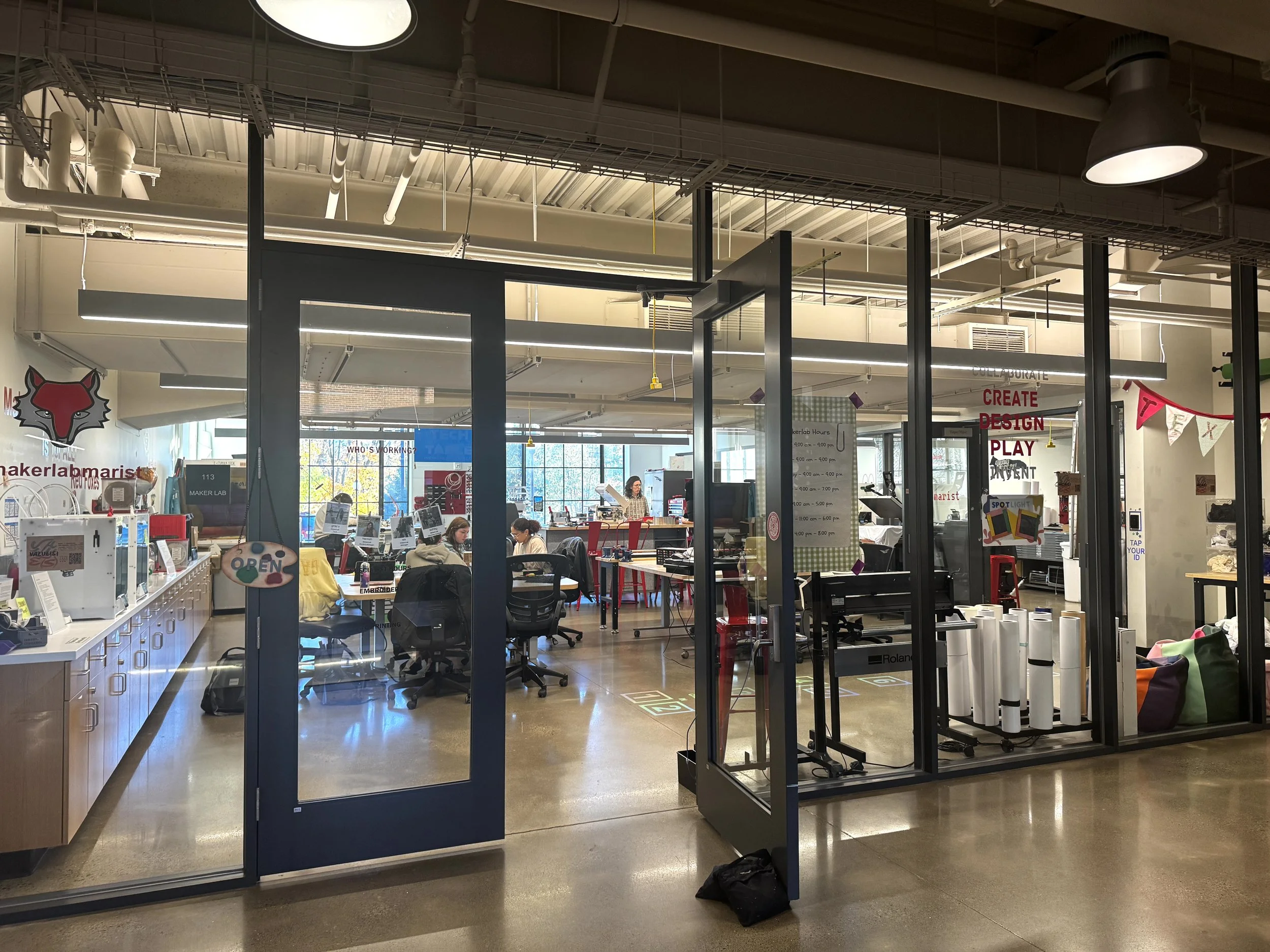Marist’s Maker Lab Encourages Creativity and Community Across Campus
Open daily inside the Steel Plant, the Maker Lab is available to any student looking to learn new skills, boost their creativity and build community. Photo by Francesca Oliva '28
Nestled in the Steel Plant, Marist University’s Maker Lab has been a staple of creativity and community since the building’s renovation in 2018. Inside, students of any discipline can create 3D printed objects, utilize sewing and embroidery machines, make t-shirts on the heat press, laser print on fabric and more.
The community art space is open to all students for class projects, work or even personal use. Many professors assign students projects to do in the Maker Lab to familiarize them with this unique resource on campus. If students need assistance on a project, there are student workers who are trained in different specialties, such as 3D printing, textiles and embroidery, available to help.
“I first started out as just a normal tech, meaning I worked with all of the machines within the shop,” said Gabriella Cortes ‘28, a 3D printing specialist at the Maker Lab. “I became qualified through my first semester fully working there. When I was just a tech, I was always playing around with 3D, so I picked up on things quickly.”
With state-of-the-art machinery for students to use, the Maker Lab is a space of learning and growth for many students. The Maker Lab follows a peer-to-peer model, with students working as teachers to their fellow students. Open every day of the week, the Maker Lab welcomes students to come in and learn a new machine or method to boost their creative energy and gain a new skill.
“Don't be afraid to come in here and make things, and also don't be afraid to make mistakes,” said Grace Manning ‘28, a student worker at Maker Lab. “Most of the time, when you come in here with a project or an idea, we'll end up having to troubleshoot. The beauty of Maker Lab is that we're all learning with each other, and if something goes wrong, we'll work through the problems together.”
Students can also participate in the Maker Lab’s many programs that they host throughout the year. This semester, they have held workshops on Halloween headbands, tumbler laser-engraving, felt pendant making and stamp carving.
Most of the workshops are geared towards students looking to learn how to use a specific machine in the Maker Lab, while others focus on using Maker Lab materials to create a fun craft.
“We host workshops to show people, especially those not in fashion or art, what Maker Lab has to offer,” said Hannah Bell ‘28, a student manager at Maker Lab. “I think the workshops are one of my favorite parts. I go even when I'm not working.”
“Maker” culture and the do-it-yourself (DIY) movement spread throughout the United States in the early 2000s, with the magazine “Make” cited as one of the key influences in bringing the maker movement to light. “Make” caters to audiences looking to do projects related to computers, robotics, woodworking and more, spurring new ideas in the DIY community.
In addition to “Make” and an increased DIY mindset, emphasis was placed on STEM in educational spaces throughout the 2010s. There are now hundreds of colleges and universities that have maker spaces featuring high-tech machinery and innovative tools similar to Marist’s.
Maker Lab at Marist strives to serve the dynamic population of students, whether they are STEM majors or art majors. Inside the space, changes have been made to better reflect student needs and help to build an inclusive environment.
“My favorite change might be our new textile corner or the recycle zone,” said Bell. “We have also started using Spanish around the Maker Lab, such as including Spanish on the ‘The Maker Lab is for ALL Red Foxes’ sign.”
The Maker Lab staff have worked to ensure that students, no matter their major or experience level, can participate in the space. These efforts help create a collaborative and supportive environment for students to build new skills and enhance their creativity.
“The word ‘maker’ probably means a lot of things to many different people. Everyone can be a maker, no matter what. If you make something, you are a maker,” said Ais Oisín, the manager of Maker Lab.
As the Maker Lab continues to change and adapt, it serves as a reminder of how important creativity and collaboration are to campus life. The space brings together students of all interests, skill levels and disciplines to experiment, build and learn from one another.
The Maker Lab is more than just a workspace for students, but a community where ideas can become reality and campus connections can grow.
